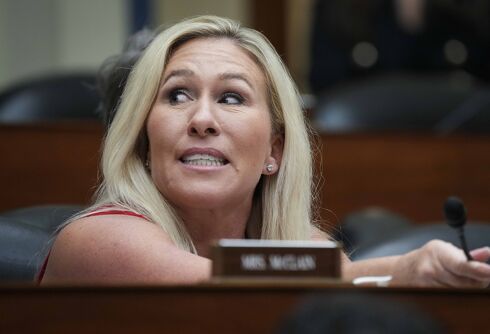Three transgender candidates for the Ohio House of Representatives have sparked debate in the Buckeye State over an obscure law requiring them to disclose their deadnames, leading both Democratic and Republican lawmakers to introduce dueling bills to address the situation.
In January, real estate photographer Vanessa Joy, who was running as a Democrat in Ohio’s firmly Republican House District 50, was disqualified from the race by the Stark County Board of Elections due to a state law requiring candidates to disclose any name changes that have taken place within the last five years. Joy, who is transgender and changed her name in 2022, has said she was unaware of the law, which was not mentioned in the Ohio secretary of state’s 2024 candidate guide and has not been included in previous candidate guides in recent years. Nor did the candidacy petition forms Joy filled out include any mention of the law or space to list any name changes.
Related:
Ohio elections board refuses to allow trans woman to run for office because of old law
Vanessa Joy was booted off the ballot because she did not include her deadname on official documents.
Two other transgender Democrats also had their candidacies for Ohio state House seats challenged under the same law. But both Bobbie Arnold and Arienne Childrey have since been cleared to have their names appear on the November ballot.
Insights for the LGBTQ+ community
Subscribe to our briefing for insights into how politics impacts the LGBTQ+ community and more.
Last week, Democratic state Reps. Michele Grim and Beryl Brown Piccolantonio introduced a bill that would prevent future trans candidates from being disqualified from running. House Bill 467 would amend the existing law so that candidates would not have to disclose their recent legal name changes if the name change was approved by an Ohio court. The bill would also require candidate forms to include space to list previous names used within the last five years and require the Ohio secretary of state to include information about the name change requirements in candidate guides.
“This is common sense legislation that will provide a simple fix so those who decide to run for office can approach the decision without ambiguity of the requirements,” Grim told WEWS. “This most recent primary cycle brought to light an unevenly enforced requirement that needs to be clarified.”
At the same time, Republican state Reps. Rodney Creech and Angie King have introduced their own bill, which would allow Republicans to protest Democratic primary candidates and vice versa. As WEWS notes, current state law only allows voters to protest the candidacies of members of their own party.
Creech will face Arnold in November’s election, while King will face Childrey — facts that are certainly not lost upon Arnold and Childrey.
“They happen to be the only two representatives in the state of Ohio that are facing trans candidates as their Democratic opponents,” Childrey said.
“That is absolutely no coincidence at all in my mind,” Arnold said.
In a statement released by LPAC, an organization dedicated to electing LGBTQ+ women and nonbinary candidates, Childrey questioned whether King’s support of the bill “is related to her failed attempt to have one of her GOP friends remove me from the ballot.
“It seems like she can’t handle facing a trans woman who won’t back down from her bigotry,” Childrey said in her statement.
According to WEWS, King did note her frustration over the fact that a challenge to Childrey’s candidacy brought by the chair of the Mercer County Republican Party was thrown out because of current law preventing registered Republicans from protesting Democratic primary candidates.
“I’m not going to cover anything up — I think if they want to get on the ballot, they need to follow the law just like I do,” Creech told WEWS. “What bothered me was the three transgender candidates in Ohio put their name on the ballot as Democrats and could only be challenged by Democrats.”
“It’s their responsibility to properly complete the form,” King said, even though it has been widely reported that candidate forms do not currently include space to list name changes.
According to WEWS, both Creech and King, who are heavily favored to win in their deep red districts, said they are unbothered by the fact that their opponents are trans, and cast their bill as a bipartisan measure towards accountability and transparency.
But Arnold and Childrey accuse their Republican opponents of hypocrisy. WEWS notes that Ohio Republicans have introduced numerous bills to ban members of one party from voting in the other party’s primary. GOP lawmakers say the measures would prevent Democrats from voting for weaker Republican candidates, which they characterize as “primary meddling.”
“The argument that we’ve heard is ‘we don’t want the opposing party meddling in someone’s primary,’” Childrey explained. “At the same time that Republicans want to champion that, they want the ability to meddle in our primaries.”
LPAC executive director Janelle Perez responded to the Republican bill in a statement. “The harsh reality is that transgender candidates are forced to navigate a political landscape filled with discrimination and disregard for their safety and dignity. The insistence on using deadnames on petitions and ballots not only erases their true identity, but also exposes them to potential harm. It is unconscionable that in this day and age, transgender individuals are still being subjected to such dehumanizing treatment. This blatant disregard for the fundamental principles of fairness and inclusion is not only appalling but also a grave threat to our democratic values,” Perez said. “LPAC is deeply troubled by the Ohio GOP’s repeated attacks on transgender candidates seeking to serve their communities. It is imperative that we stand united against these reprehensible acts of discrimination. Every individual, regardless of gender identity, deserves the right to run for office and have their candidacy judged on merit alone.”















